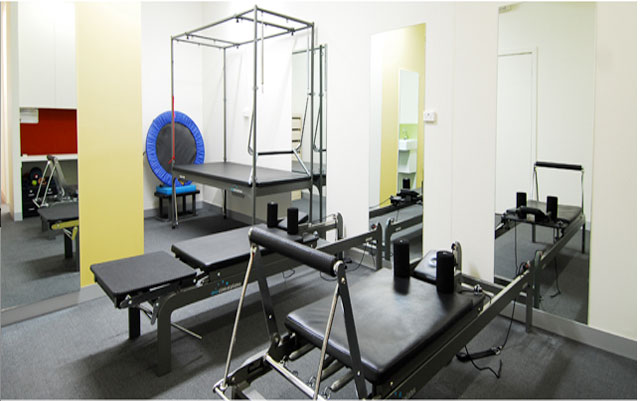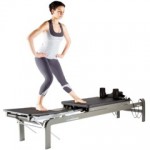What is Clinical Pilates
Clinical Pilates is a system of safe and effective exercises which meet your specific individual needs. One of the DMA Clinical Pilates trained physiotherapists at CW Physio will assess you to determine what is called your “Direction Preference.” A direction preference is simply the direction in which your body likes to move, and by exercising into this direction, Clinical Pilates very effectively and specifically treats the cause of your particular problem.
Clinical Pilates is used by our physiotherapists to treat a wide range of injuries and conditions, ranging from low back pain and chronic pain to hypermobility and dysautonomia and chronic fatigue syndrome. By working into your body’s preferred movement, Clinical Pilates improves your movement, stability, balance, posture and overall function.
The exercises prescribed in a CWP Clinical Pilates program are highly specialised and specific to each individual. The exercises you receive depends on your direction preference, current fitness level and your aim of treatment, (which usually is to decrease your pain, improve your movement and fix your problem)
Because of this, Clinical Pilates offers a system of safe, effective and highly specific exercises appropriate for all ages and people. There are stages of exercises that you can progress through and will allow you to see the improvements in your strength, control and healing.
Differences between Regular and Clinical Pilates
There are three important differences between regular Pilates and clinical Pilates.
- Regular Pilates offers general exercises, whereas the exercises prescribed in a Clinical Pilates session are specific. This means that a normal Pilates program will consist of non-specific exercises which are multi-directional. Clinical Pilates offers a program that is direction specific and therefore will enhance the effect of the exercise. An example of this is low back pain that is disc related. Usually, such patients will be more comfortable moving into lumbar extension (i.e bending backwards). So a typical Clinical Pilates program will contain exercises that move such a person into lumbar extension only.
- Regular Pilates classes normally recommend a generalised program of exercises to each person, where as with Clinical Pilates, each patient is prescribed specific exercises that are tailored to those individuals’ precise needs.
- Regular Pilates is conducted by a Pilates instructor, whereas Clinical Pilates is prescribed and supervised by a Clinical Pilates trained Physiotherapist. This difference is very important because a Physiotherapist, unlike a Pilates instructor, has an in-depth knowledge of injury, pathology, bodily function and healing. This knowledge allows a Physiotherapist to assess each patient and determine which exercises will be the most effective for each individual.
How is Clinical Pilates used at Complete Wellness Physiotherapy?
The staff at Complete Wellness Physiotherapy in Kalamunda have all completed post-graduate qualifications in DMA Clinical Pilates.
Moz Quinn, the practice principal, is a senior lecturer and presenter with Dance Medicine Australia (DMA Clinical Pilates and Physiotheray). In this capacity, Moz trains physiotherapists around Australia in the theoetical and practical application of Clinical Pilates. His involvement ensures that CWP remains at the cutting edge of evidence-based physiotherapy and Clinical Pilates.
THE PROGRAM
Initial Assessment
The Clinical Pilates program always begins with an assessment. This is a 40 minute session in which one of our Physiotherapists will determine which exercises will work best for you.
This involves determining which direction your body prefers to move in, and your current level of balance, stability and muscle activity. To assist with establishing specific muscle activity, the session may include the use of Real Time Ultrasound, which will allow our Physiotherapists to look at how well the deep muscles of you back and abdomen are working.
Supervised Session
Once your specific exercises have been established, you can begin taking part in supervised sessions in the Clinical Pilates studio. These sessions are one hour long and are fully supervised by one of our physiotherapists, who assess your technique to ensure the exercises are being performed correctly and answer any questions you may have. A maximum of three participants can attend a supervised session.
Independent Sessions
Once you feel confident and competent with your specific program, you can advance to an independent program, where you will be able to use our studio and its equipment at regular intervals on your own. A Physiotherapist will regularly monitor your process and prescribe more advanced exercises as you progress.
Complete Wellness Physiotherapy also offers Clinical Pilates Memberships, details of which can be obtained from our front desk staff.
Equipment used at Complete Wellness Physiotherapy
The Clinical Pilates program at Complete Wellness Physiotherapy incorporates the use of state of the art equipment, manufactured by DMA Clinical Pilates.
The Clinical Reformer
The Clinical Reformer is a piece of equipment developed by DMA Clinical Pilates in Melbourne which has been specifically designed to accommodate and augment Clinical Pilates exercise based on the most up-to-date research findings. Importantly the Clinical Reformer is multi-adjustable and very safe, allowing for people of any age or fitness level to perform the specific exercises that best suit their needs.
The Full Trapeze Table
The Full Trapeze Table is the largest and most versatile piece of equipment produced by DMA Clinical Pilates. The Full Trapeze Table accommodates an extensive range of Clinical Pilates exercises and allows for these exercises to be performed safely at a variety of resistance levels. Like the Clinical Reformer, the Full Trapeze Table was developed based on the most recent research findings regarding spinal stability training.
CWP in Kalamunda also makes use of a variety of accessory equuipment which is used to augment the Clinical Pilates exercises being performed using our equipment, ensuring that our patients receive the most appropriate exercise possible.
Benefits of Clinical Pilates
A great aspect of Clinical Pilates is the positive result it has on the human body as a whole. Clinical Pilates is evidence-based and is used to treat and manage low back pain and spinal pain, however the benefits do not stop there. As well as being excellent with pain management, Clinical Pilates has been shown to prevent injuries, improve balance and stability, strengthen and tone muscle and improve bone density.
Clinical Pilates has also been shown to improve neural function, combat depression and promote a strong sense of well being. And finally, due to its high effectiveness, research shows that patients participating in Clinical Pilates programs spend less and are more satisfied with their treatments.
- Prevention and treatment of back pain & injury
- Resolution of spinal pain
- Enhanced core stability and pelvic floor function
- For the elderly, enhancement in movement, balance, agility and flexibility
- Falls prevention
- Muscle toning without adding bulk
- Increased bone density (for Osteopaenia & Osteoporosis)



